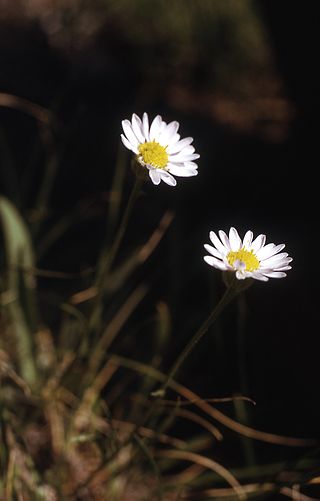
Eriophyllum lanatum, with the common names common woolly sunflower, Oregon sunshine and golden yarrow, is a common, widespread, North American plant in the family Asteraceae.

Xerophyllum tenax is a North American species of plants in the corn lily family. It is known by several common names, including bear grass, soap grass, quip-quip, and Indian basket grass.

Agastache is a genus of aromatic flowering herbaceous perennial plants in the family Lamiaceae. It contains 22 species, mainly native to North America, one species native to eastern Asia. The common names of the species are a variety of fairly ambiguous and confusing "hyssops" and "mints"; as a whole the genus is known as giant hyssops or hummingbird mints.

Dicentra formosa is a species of flowering plant in the poppy family, Papaveraceae. With its fern-like foliage and inflorescence of drooping pink, purple, yellow or cream "hearts", this species is native to the United States' Pacific Northwest and West Coast of North America.

Primula pauciflora, the pretty shooting star, few-flowered shooting star, dark throat shooting star or prairie shooting star, is a species of flowering plant in the primula family Primulaceae. It is a widespread and very variable species, native to western North America, from Subarctic America to Mexico, often in xeric and desert habitats. It is found in the Great Basin Deserts and Mojave Desert. Its synonyms include Dodecatheon pauciflorum and Dodecatheon pulchellum.

Erigeron eatonii is a North American species of flowering plants in the family Asteraceae known by the common name Eaton's fleabane.

Helianthus cusickii is a species of sunflower known by the common names Cusick's sunflower and turniproot sunflower. It is native to the western United States from Washington, Oregon, Idaho, northern California, and northwestern Nevada.

Hulsea algida is a species of flowering plant in the daisy family, known by the common name Pacific hulsea or alpine gold. It is native to the western United States.

Caltha leptosepala, the white marsh marigold, twinflowered marsh marigold, or broadleaved marsh marigold, is a North American species of flowering plant in the buttercup family. The species has regionally distinct variations.

Cirsium scariosum is a species of thistle known by the common names meadow thistle, elk thistle and dwarf thistle. It is native to much of western North America from Alberta and British Columbia, south to Baja California. There are also isolated populations on the Canadian Atlantic Coast, on the Mingan Archipelago in Québec, where it is called the Mingan thistle.
Crepis bakeri is a species of flowering plant in the family Asteraceae known by the common name Baker's hawksbeard. It is native to the western United States where it grows in many types of mountain and plateau habitat. It is found in Oregon, Washington, Idaho, northern California, Nevada, and Utah.

Nothocalais troximoides is a species of flowering plant in the family Asteraceae known by the common name sagebrush false dandelion. It is native to western North America, including British Columbia and the northwestern United States.

Penstemon speciosus is a species of penstemon known by the common name royal penstemon of western North America.

Phlox diffusa is a species of phlox known by the common name spreading phlox. It is native to western North America from British Columbia to the southwestern United States to the Dakotas, where it grows in many types of habitat, including rocky, high elevation mountain slopes. It is a very compact mat-forming perennial herb growing in cushions or patches of short, decumbent stems. The linear, lance-shaped, or needle-like leaves are no more than 1.5 centimeters long and are oppositely arranged in bundles on the short stems. The inflorescence is a solitary tubular flower around a centimeter long. It has a flat white or pale pink or blue corolla with five lobes each just under a centimeter in length.

Ribes cereum is a species of currant known by the common names wax currant and squaw currant; the pedicellare variety is known as whisky currant. The species is native to western North America.

Angelica capitellata, synonym Sphenosciadium capitellatum, is a species of flowering plant in the family Apiaceae. When treated as Sphenosciadium capitellatum, it was the only species in the monotypic genus Sphenosciadium. It is known by the common names woollyhead parsnip, ranger's buttons, button parsley, and swamp white heads.

Allium bisceptrum, also known as the twincrest onion or aspen onion, is a high elevation plant native to western United States. It is a perennial that thrives under damp and shady conditions or open meadows in California, Arizona, New Mexico, Nevada, Oregon, Washington, Idaho, and Utah.

Askellia pygmaea, the dwarf alpine hawksbeard, is a species of Asian and North American plants in the tribe Cichorieae within the family Asteraceae.

Penstemon gairdneri is a species of perennial plant in the Plantaginaceae family with the common name Gairdner's beardtongue. It is native to Washington, Oregon, and Idaho in the western United States.

Townsendia florifera is a low growing herbaceous flowering plant in the family Asteraceae, with the common name showy Townsendia.





















